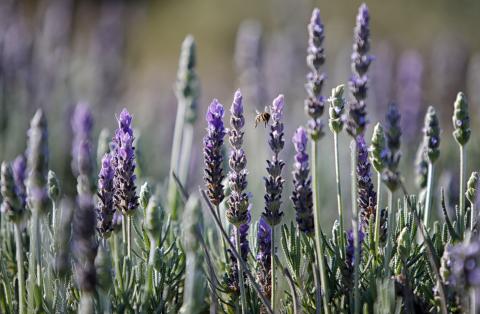Roques Blanques hosts the first educational beehive in a cemetery, a pioneering initiative that promotes bee protection

El Papiol (Barcelona), November 20, 2020 – Sensitive to the environment and proactive in improving environmental management since it opened over 35 years ago, the Roques Blanques Regional Cemetery has taken another step towards sustainability with the launch of a bee protection project that promotes pollination through the establishment and management of an educational apiary. The cemetery, owned by the Baix Llobregat County Council and managed by Àltima, is the first in the country to implement such an initiative with the aim of promoting the protection of these insects, whose global population has halved in many parts of the world, and raising awareness about their essential pollination work in favor of biodiversity.
From the Roques Blanques apiary, which includes a beehive for observing and caring for these insects alongside a garden with various native honey plants from Collserola – lavender, rosemary, thyme, sage – the cemetery will not only contribute to the protection of these pollinators but also bring bees closer to both adults and children through informational panels and guided visits to the space. As Joan Ventura, General Director of Àltima Cemeteries, explains, “Roques Blanques represents a new concept of cemetery, very different from those we are used to seeing. Since its inception in 1984, we have always been very aware that we are in a privileged natural environment that must be preserved and promoted. In this sense, with this beekeeping project, we not only help the survival of bees but also reinforce our commitment to a sustainable and vibrant cemetery.” From this new apiary, Roques Blanques will promote responsible and respectful beekeeping, following a sustainable production model that prioritizes the well-being of the bees and their restorative role in the ecosystem of the mountains.
The strong commitment to the surrounding environment has led Roques Blanques to collaborate closely with the Consorci del Parc Natural de la Serra de Collserola, supporting various projects to promote the native flora and fauna of the area. Regarding the new educational apiary, Joan Vilamú, head of the Natural Environment and Territory Service at the Consorci, highlights the great importance of these insects for maintaining Mediterranean ecosystems, such as Collserola. “Due to proximity to large urban and industrial centers, Collserola is a park heavily threatened by human activity, pollution, and climate change, among other factors. These consequences directly harm various plant and animal species, including bees, whose population has significantly declined in recent years.” According to Vilamú, “The pollination function of these hymenoptera is essential for ensuring the preservation and survival of the park’s ecosystem. In Collserola, ecological beekeeping is being promoted, but without neglecting other pollinator species, especially larger pollinators like Bombus terrestris and others.” Beyond the immediate environment, the role of bees is vital for ensuring our survival: according to the Food and Agriculture Organization (FAO), over 75% of global food crops depend on pollination.
Sustainable and Solidarity Beekeeping
The management of the new Roques Blanques apiary adheres to the principles of artisanal, sustainable, and ecological beekeeping, based on respect for the bees and their biological rhythm, without production goals or stress. “We promote careful and sensitive beekeeping, always respecting native fauna and flora, bringing society closer to the magical and wonderful world of bees. We believe that education is the main tool for raising social awareness, fostering appreciation for the improvement and recovery of natural environments,” explains Eric Barbero, beekeeper at the Park and founder of Melvida, responsible for supervising the educational apiary at Roques Blanques with advice from the technical team, biologists, and forest rangers of the Collserola Natural Park. Melvida operates several apiaries in strategic locations in the Park to carry out the vital function of these insects.
Aligned with the Sustainable Development Goals (SDGs), the Roques Blanques initiative is also part of the Aristeu project, which promotes the return of organic pollination to nature through the protection of bees and other insects. In addition to the sustainability aspect, the project includes a solidarity component, collaborating with social entities through the donation of honey or the promotion of employment for vulnerable groups through the artisanal production of products from wax, such as candles. In this regard, the cemetery works with Esclatec, a special employment center known for the labor integration of people with disabilities.
Amazing Insects
Bees are not only fascinating for the numerous benefits they provide to the ecosystem. Did you know that...
- ...they have existed for over a hundred million years and coexisted with dinosaurs?
- ...tools from Ancient Egypt still contain honey in good condition after more than 4,000 years?
- ...to produce a kilogram of honey, bees visit millions of flowers and travel distances equivalent to four trips around the world?
- ...the temperature inside the hive is constant throughout the year?
- ...apitoxin is the name of bee venom and is used in the pharmaceutical industry?